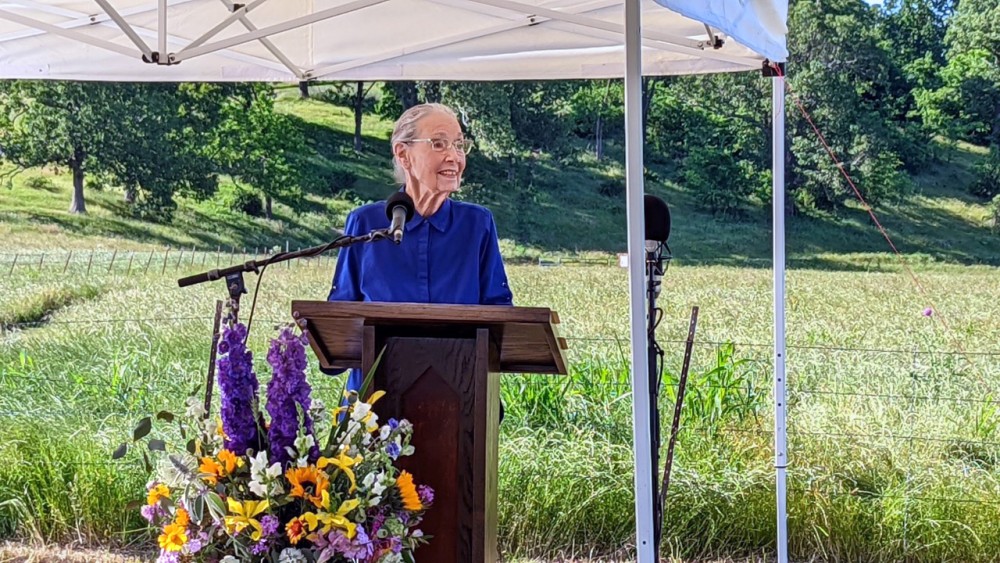Methodist woman donates 25 acres for Arkansas bird sanctuary

Betty Hinshaw had always lived in cities when her husband decided, in 1956, that they should move to rural Northwest Arkansas. She made him promise there wouldn’t be snakes.
They saw one the first day as they drove the dusty road to their old farmhouse. It had a newly installed bathroom but no air conditioning. The nearest school was two rooms—not counting outhouses.
So much was new, but Hinshaw quickly took to country life and especially the land she and her husband owned: Rocking Chair Ranch. They raised four children there, and she became deeply involved in the community, including the Methodist church.
At 97, Hinshaw still lives on the ranch, in a more comfortable home than the original. But she doesn’t own as much of the pastureland she loves to look out on.
That’s because she recently donated 25 of her roughly 100 acres to the Northwest Arkansas Land Trust for the new Betty Hinshaw Bird Sanctuary.
“Our feathered friends have been happy here for years,” she said in prepared remarks for the June 2 dedication. “And now their special area will be safe in the hands of the Northwest Arkansas Land Trust.”
The ceremony drew a crowd of Hinshaw’s family members and friends. Among the speakers was Andrew Thompson, pastor of First United Methodist Church of Springdale, Arkansas, where Hinshaw has been a member for more than six decades.
“Ms. Betty and her family have been dedicated to serving our community for decades,” Thompson said in an email interview. “Dedicating her land for a perpetual bird sanctuary is an extension of that service. I think it’s wonderful.”
The bird-watching will get better as the pastureland is restored to native grasses and becomes prime habitat for grasslands birds, said Marson Nance, Northwest Arkansas Land Trust’s director of land stewardship and research.
Along with appreciating rural Northwest Arkansas, Hinshaw became a protector of it. That extended to wildlife—even snakes.
Her daughter Dawn remembers that if one was close to the house, Betty wouldn’t kill it or have it killed. Instead, she would grab a shovel or rake, scoop the snake up or let it curl around the handle, and walk it to the pasture for a safe release.
Betty tended injured animals, too, and kept the bird feeders full.
“I’ve always said about my mom that she was an environmentalist before environmentalism was cool,” Dawn Hinshaw said.
The Hinshaw family has been around long enough to see Northwest Arkansas, part of the Ozarks, become the state’s fastest-growing region. Betty had read in the newspaper about the Northwest Arkansas Land Trust, which works to preserve natural areas and historic structures. With the support of her family, she decided to give land for a bird sanctuary.
The Northwest Arkansas Land Trust has done research on the bird sanctuary and remaining Hinshaw property, which includes a creek and a lake where bald eagles and ospreys dive for fish.
The land was classified as oak barrens in an 1832 federal government survey. That means it was mostly savanna, with an understory of native grasses and wildflowers, and a scattering of white and blackjack oaks.
The trust plans dawn-to-dusk public access to the sanctuary, but the management priority is restoring native grasses, shrub thickets, and pollinator habitat.
A 2019 study, reported in Science magazine, estimated that the North American bird population has declined by 3 billion since 1970. Grassland bird species—such as Eastern meadowlark, bobolink and Henslow’s sparrow—are particularly threatened, leading to a critical need for habitat preservation and restoration.
The Betty Hinshaw Bird Sanctuary is the first Northwest Arkansas Land Trust property dedicated to bird conservation, and it’s one of the region’s first to focus on grassland birds.
At the sanctuary dedication, Hinshaw quoted Genesis on God’s command to Noah about filling the ark (“seven of every kind of bird, male and female”). She also shared her concern about global warming.
Hinshaw’s 25-acre gift is an act of environmental protection but also a way of paying forward, in perpetuity, her good fortune in coming to rural Northwest Arkansas.
“I love this land,” she said. “I loved it from the beginning, really.” —United Methodist News Service





